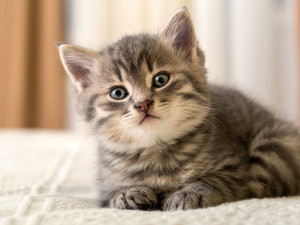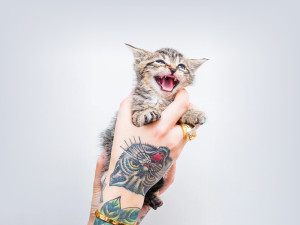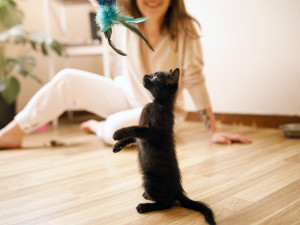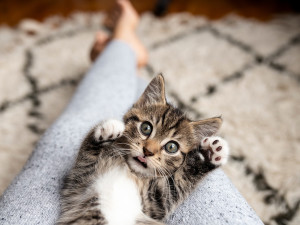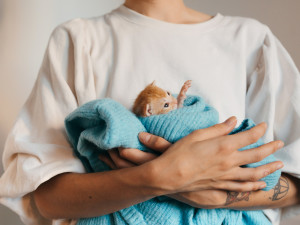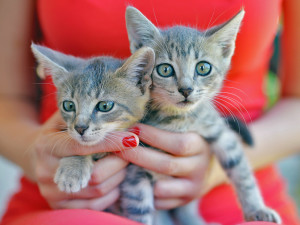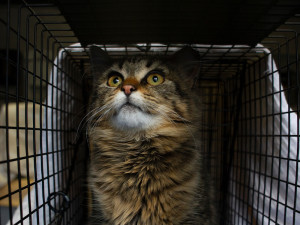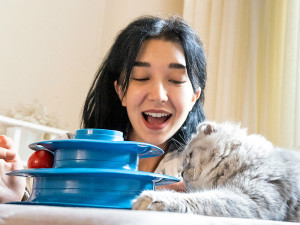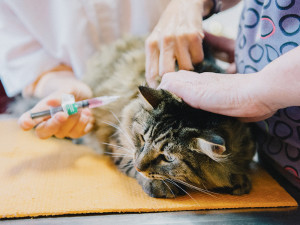Kittens Really Need Their Moms—Science Says So
The “I’m just a baby” TikTok sound definitely applies here.
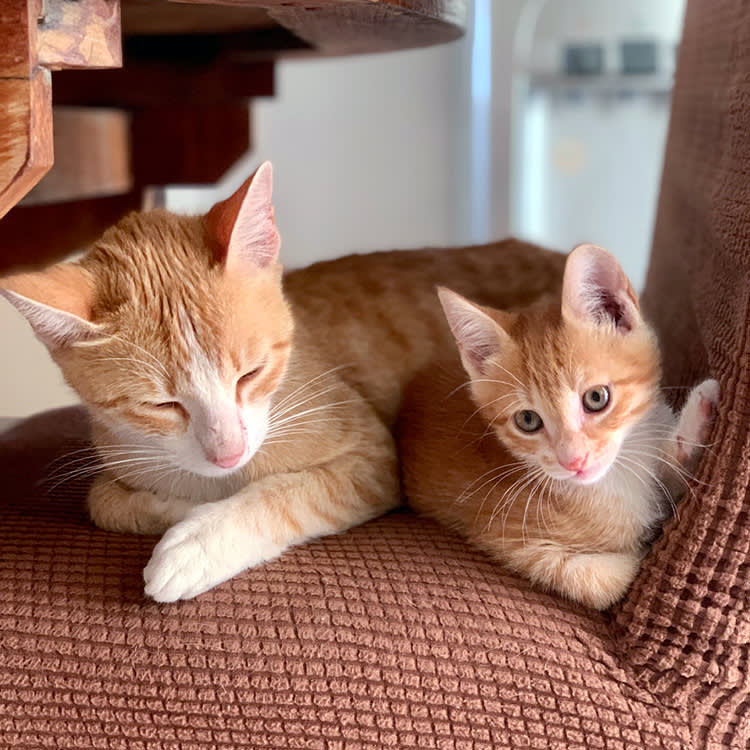
Share Article
So many animals need their moms — that’s true for a lot of humans. When many of us think back to the first time we got sick after moving away from home, we remember calling our moms (or a parental figure in our lives) just to seek reassurance that we weren’t dying. While humans generally never stop needing our moms/parents, cats especially need their moms when they are kittens.
According to recent researchopens in new tab, kittens truly need their birth moms to develop as the best kittens they can possibly be. Removing kittens from their moms too early has negative effects on their behavior, and that’s true of individuals who continued to be with their siblings, as well as those who were alone.
There are a lot of hand-raised kittens (reared by a human) because the mom couldn’t take care of them for whatever reason. But there has been little investigation of how mom-less kittens develop in ways that are different than kittens with moms. Rest assured, no kittens in this study were purposely raised as orphans for the sake of science. The participating orphaned kittens were all without moms because of bad luck and not because of researcher’s goals. (And in further good news and so nobody worries about the kittens, all of them were adopted by families after the study was over.)
There were three types of kittens in the study: those who were raised by their moms, those who were hand-raised with littermates, and those who were hand-raised as singletons. All 62 kittens were given three behavioral tests at the age of nine weeks. In each of these tests, there were behavioral differences between the orphaned kittens and the mother-reared kittens.

Handling test
A person petted the kitten three times and then picked them up, continuing to hold them until they started to struggle or for 30 seconds — whichever came first. Researchers compared the time it took the different types of kittens to start to struggle, if they did so within the 30 seconds. Orphaned kittens struggled sooner than mother-reared kittens. This test was performed in the room where the kitten was living to avoid the additional stresses of a new area and more handling time.
Separation and confinement test
Researchers placed each kitten in a carrier in a room by themselves for five minutes and videotaped them to compare the behavior of each type of kitten. Orphaned kittens were not able to settle down as easily as mother-reared kittens in this situation. The orphans vocalized more and did so sooner, and they exhibited greater levels of activity and more time pawing at the sides of their carrier.
Food defense test
Researchers gave each kitten a small, bite-size piece of meat and then attempted to steal it with tongs. Observers noted how each kitten reacted to the attempted theft. Orphaned kittens who were raised with littermates began to eat the meat sooner than other kittens but were not more defensive or aggressive in the situation. There was no difference in the amount of hissing, growling, stomping, or swiping among the different groups of kittens.
How can this information help orphaned kittens?
These results show an increased stress response due to being raised as an orphan. Their findings suggest having siblings was not helpful in handling the stress of these tests. However, siblings may help in other, as-yet-unstudied ways such as learning play skills or bite inhibition — stay tuned for more research. Additional studies are necessary to understand the long-term effects of being raised as an orphan kitten. These kittens were all studied at nine weeks, but we don’t know how being orphaned affects their behavior later in life.
For now, it’s important to consider the behavioral differences of orphaned kittens in fostering and adopting in order to enhance their well-being as much as possible. Being orphaned is a category of social isolation, and it’s no wonder it affects young individuals’ ability to cope with stress.
What are the best ways to minimize kittens’ stress?
Anything we can do to mitigate that stress is likely to benefit orphaned kittens. Feeding on a schedule, handling kittens like a cat mom would, and limiting isolation may help kittens who are without their moms at an early age. Avoid taking kittens away from their moms to adopt them out at early ages. Consider placing kittens in foster situations with unrelated nursing mother cats when possible.
In the best of all possible worlds, no one ever loves you like your mom (especially when she takes all those “Mom, I’m sick!” phone calls). Lots of living beings are not lucky enough to have a mom who lives up to this ideal, and many others lose their mom far too early — that is true across species. Since Freud psychology has taken to his assertion that “If it’s not one thing, it’s your mother” and often approaches understanding the mind and emotions with a focus on moms. For cats, the absence of mom supports this long-held belief that moms are powerful and oh, so influential.
References:
Effects of Early Social Separation on the Behaviour of Kittens of the Domestic Catopens in new tab

Karen B. London, PhD, CAAB, CPDT-KA
Karen B. London is a certified applied animal behaviorist (CAAB) and certified professional dog trainer (CPDT) who specializes in working with dogs with serious behavioral issues, including aggression. She has written for a variety of magazines including The Bark, Clean Run, and the APDT Chronicle of the Dog, and has published in scientific journals including Behavioral Ecology and Sociobiology, Ethology, Ecology, and Evolution, the Journal of Insect Behavior, and Insectes Sociaux. She is the author of seven books about dog training and canine behavior, including the forthcoming My Dog's Mystery Adventure: And Other Stories From a Canine Behaviorist and Dog Trainer.
Related articles
![A kitten laying on a persons lap with their paws in the air.]()
6 Things to Know Before Fostering a Cat
Ready to make a difference in a kitten’s life?
![anonymous woman pampering and taking care about a small ginger kitten]()
6 Ways to Help Local Shelters Without Committing to Full-Time Pet Parenthood
Learn how you can be there for animals in need this National Pet Day.
![Woman holding two young kittens.]()
Why Kitten Season Is Getting Longer and More Intense Every Year
And what you can do to help.
![A fluffy red-brown cat in a crate]()
How Flatbush Cats Is Saving Brooklyn’s Strays
Ad agency strategist Will Zweigart founded a nonprofit to tackle the neighborhood’s street cat epidemic.
![Woman playing with her cat.]()
Your Cat Really Wants You to Play With Them—Here’s How
It’s the key to a happy cat.
![cat getting a vaccine at the vet]()
Yep, Kittens Need Vaccines (Even Indoor Ones)
A vet gets the facts straight.

